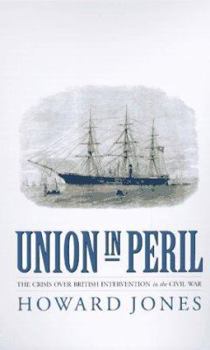Union in Peril: The Crisis Over British Intervention in the Civil War
(Part of the Civil War America Series)
Select Format
Select Condition 
Book Overview
The Lincoln administration feared that Great Britain would officially recognize the Confederacy during the Civil War, thereby granting legitimacy to secession and undermining the U.S. Constitution. What did happen, and why, is brilliantly described by Howard Jones in Union in Peril: The Crisis over British Intervention in the Civil War .
Format:Paperback
Language:English
ISBN:0803275978
ISBN13:9780803275973
Release Date:January 1997
Publisher:Unp - Nebraska Paperback
Length:302 Pages
Weight:0.85 lbs.
Dimensions:0.7" x 5.4" x 8.9"
Customer Reviews
3 ratings
Interesting aspect of the Civil War
Published by Thriftbooks.com User , 15 years ago
There's really nothing negative I can say about this book. It's thorough, a good read, suspenseful, and includes the proper amount of analysis. I read this for a research paper and really enjoyed it. Great Britain declared its neutrality in the Civil War in 1861. From that point to the beginning of 1863, a lot happened that encouraged the British to give serious consideration to intervening in the war. There was the Trent affair, the Alabama ship issue, and the fact that a significant amount of British people opposed the North for many reasons. The British, led by the cautious hand of Palmerston, waited for exactly the right moment to intervene when it wouldn't be too costly to their own interests. That moment never came, though it very nearly did. Jones argued that had Lee not immediately followed up victory in the second battle of Bull Run, the British may have intervened. Instead, they waited to see what happened in Lee's move to the north, and the result was a loss at Antietam. There's more to this story, but the fact is, Jones tells it well. It's interesting, and it's an oft-overlooked aspect of the war. Had the British intervened, the whole history of our country would have been dramatically different. This was a job well done by Jones.
Intriguing book - Foreign diplomacy during Civil War
Published by Thriftbooks.com User , 17 years ago
Howard Jones has written a book entitled Union in Peril: The Crisis over British Intervention in the Civil War. His primary thesis is that the British cabinet had an internal crisis over whether or not to intervene in the American Civil War, and their final decision was to remain neutral. Jones does a very good job of explaining the multitude of crises that faced Lord Palmerstons' government in Britain during this period, including economic problems (lack of cotton in England), diplomatic crisis (the Trent Affair), and the humanitarian issue (whether or not slavery should be abolished in the United States and how this plays into the need for foreign intervention). The primary result of his analysis is that the British opted not to intervene in large part because they did not understand the entire nature of the conflict in America, and because neither the Union nor the rebellious Confederates could provide an adequate explanation for why the British "must" join in on one side or the other. All told, this is a good book - it is well worth reading, and it focuses largely on why Palmerston kept Britain neutral during this period. The one qualm I had with the book was that Jones brought France ( & Napoleon III) into the fray a little too often for a book that really should have been focused exclusively on Britain, despite the fact that the French policy really followed lockstep with the British policy.
War by diplomacy
Published by Thriftbooks.com User , 19 years ago
Great Britain's role in the American Civil War is a side trip that few of us make. Knowing the outline and resolution, meets the needs of the majority. An interest in naval history may lead some deeper into the role of Confederate raiders built in English shipyards. Most have accepted the story that the victory at Antietam and the Emancipation Proclamation killed any chance of intervention in the war. Others argue that their never was a chance for intervention and American paranoia was responsible for the whole crisis. Howard Jones lays out a very logical and complete history of British Intervention, American reaction and Confederate expectation. Systematically, he walks us through the economic, political and humanitarian reasons for intervention. Not from America's point of view but from the English and French government's viewpoint, following with a quick course in why they thought that the North could never conquer the South. With this foundation, the reader is ready to understand what "Neutrality" was for all both sides and why the problems were unavoidable. The one overlooked part of the puzzle is sympathy for the Confederacy and Anti-Americanism in 19th Century England. While not a driving force, it existed and is considered as it influence the course of events. The loss of cotton, the plight of the mill workers and the needs of the mill owners play across the pages too. In addition, the CSA'a heavy-handed tactics in trying to blackmail England with cotton get good coverage. Each piece is given the right consideration and explanation to keep the story moving while giving you the information needed to understand the process. Most of the story is in London with side trips to Paris, Washington and Richmond. The book is peopled with a large number of people, most of whom I did not know about. A short cast of characters with a bio, would have been helpful. Other than that, I have no complaints about this book. The subject is one I knew almost nothing about and is vital to the course of the war. This is war by diplomacy, both nicely spoken and bare knuckles brawling. Overall, it is a fascinating story of how close intervention came to being and how it was prevented from happening.






